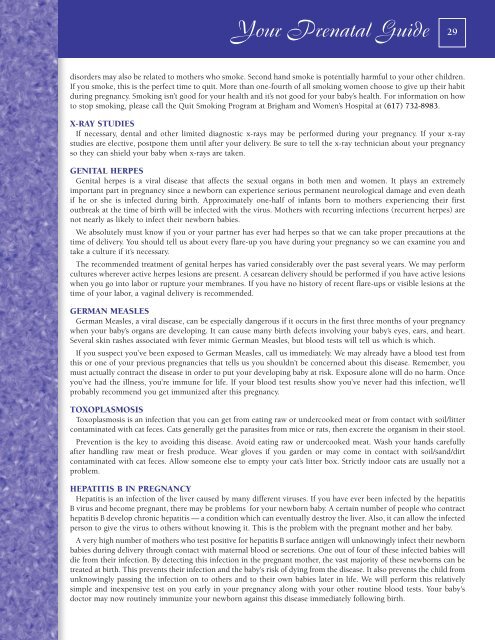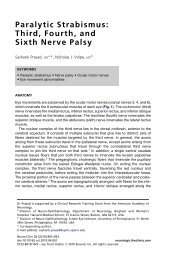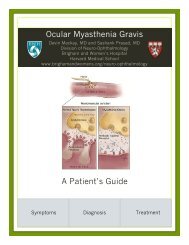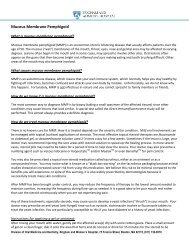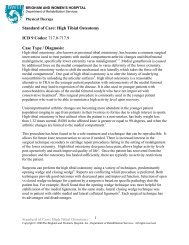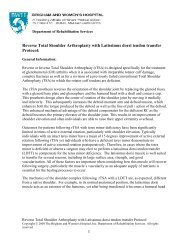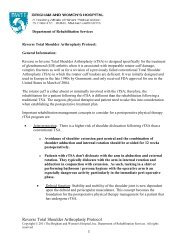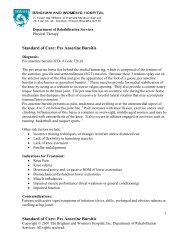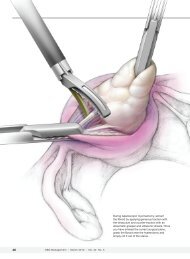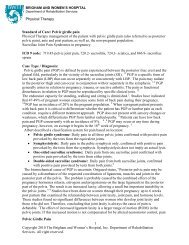Enjoying Your Pregnancy Guide to Understanding - Brigham and ...
Enjoying Your Pregnancy Guide to Understanding - Brigham and ...
Enjoying Your Pregnancy Guide to Understanding - Brigham and ...
Create successful ePaper yourself
Turn your PDF publications into a flip-book with our unique Google optimized e-Paper software.
<strong>Your</strong> Prenatal <strong>Guide</strong> 29<br />
disorders may also be related <strong>to</strong> mothers who smoke. Second h<strong>and</strong> smoke is potentially harmful <strong>to</strong> your other children.<br />
If you smoke, this is the perfect time <strong>to</strong> quit. More than one-fourth of all smoking women choose <strong>to</strong> give up their habit<br />
during pregnancy. Smoking isn’t good for your health <strong>and</strong> it’s not good for your baby’s health. For information on how<br />
<strong>to</strong> s<strong>to</strong>p smoking, please call the Quit Smoking Program at <strong>Brigham</strong> <strong>and</strong> Women’s Hospital at (617) 732-8983.<br />
X-RAY STUDIES<br />
If necessary, dental <strong>and</strong> other limited diagnostic x-rays may be performed during your pregnancy. If your x-ray<br />
studies are elective, postpone them until after your delivery. Be sure <strong>to</strong> tell the x-ray technician about your pregnancy<br />
so they can shield your baby when x-rays are taken.<br />
GENITAL HERPES<br />
Genital herpes is a viral disease that affects the sexual organs in both men <strong>and</strong> women. It plays an extremely<br />
important part in pregnancy since a newborn can experience serious permanent neurological damage <strong>and</strong> even death<br />
if he or she is infected during birth. Approximately one-half of infants born <strong>to</strong> mothers experiencing their first<br />
outbreak at the time of birth will be infected with the virus. Mothers with recurring infections (recurrent herpes) are<br />
not nearly as likely <strong>to</strong> infect their newborn babies.<br />
We absolutely must know if you or your partner has ever had herpes so that we can take proper precautions at the<br />
time of delivery. You should tell us about every flare-up you have during your pregnancy so we can examine you <strong>and</strong><br />
take a culture if it’s necessary.<br />
The recommended treatment of genital herpes has varied considerably over the past several years. We may perform<br />
cultures wherever active herpes lesions are present. A cesarean delivery should be performed if you have active lesions<br />
when you go in<strong>to</strong> labor or rupture your membranes. If you have no his<strong>to</strong>ry of recent flare-ups or visible lesions at the<br />
time of your labor, a vaginal delivery is recommended.<br />
GERMAN MEASLES<br />
German Measles, a viral disease, can be especially dangerous if it occurs in the first three months of your pregnancy<br />
when your baby’s organs are developing. It can cause many birth defects involving your baby’s eyes, ears, <strong>and</strong> heart.<br />
Several skin rashes associated with fever mimic German Measles, but blood tests will tell us which is which.<br />
If you suspect you’ve been exposed <strong>to</strong> German Measles, call us immediately. We may already have a blood test from<br />
this or one of your previous pregnancies that tells us you shouldn’t be concerned about this disease. Remember, you<br />
must actually contract the disease in order <strong>to</strong> put your developing baby at risk. Exposure alone will do no harm. Once<br />
you’ve had the illness, you’re immune for life. If your blood test results show you’ve never had this infection, we’ll<br />
probably recommend you get immunized after this pregnancy.<br />
TOXOPLASMOSIS<br />
Toxoplasmosis is an infection that you can get from eating raw or undercooked meat or from contact with soil/litter<br />
contaminated with cat feces. Cats generally get the parasites from mice or rats, then excrete the organism in their s<strong>to</strong>ol.<br />
Prevention is the key <strong>to</strong> avoiding this disease. Avoid eating raw or undercooked meat. Wash your h<strong>and</strong>s carefully<br />
after h<strong>and</strong>ling raw meat or fresh produce. Wear gloves if you garden or may come in contact with soil/s<strong>and</strong>/dirt<br />
contaminated with cat feces. Allow someone else <strong>to</strong> empty your cat’s litter box. Strictly indoor cats are usually not a<br />
problem.<br />
HEPATITIS B IN PREGNANCY<br />
Hepatitis is an infection of the liver caused by many different viruses. If you have ever been infected by the hepatitis<br />
B virus <strong>and</strong> become pregnant, there may be problems for your newborn baby. A certain number of people who contract<br />
hepatitis B develop chronic hepatitis –– a condition which can eventually destroy the liver. Also, it can allow the infected<br />
person <strong>to</strong> give the virus <strong>to</strong> others without knowing it. This is the problem with the pregnant mother <strong>and</strong> her baby.<br />
A very high number of mothers who test positive for hepatitis B surface antigen will unknowingly infect their newborn<br />
babies during delivery through contact with maternal blood or secretions. One out of four of these infected babies will<br />
die from their infection. By detecting this infection in the pregnant mother, the vast majority of these newborns can be<br />
treated at birth. This prevents their infection <strong>and</strong> the baby's risk of dying from the disease. It also prevents the child from<br />
unknowingly passing the infection on <strong>to</strong> others <strong>and</strong> <strong>to</strong> their own babies later in life. We will perform this relatively<br />
simple <strong>and</strong> inexpensive test on you early in your pregnancy along with your other routine blood tests. <strong>Your</strong> baby's<br />
doc<strong>to</strong>r may now routinely immunize your newborn against this disease immediately following birth.


